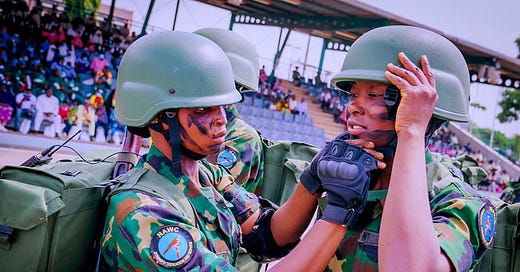When Flight Lieutenant Kafayat Sanni made history in 2019 as Nigeria’s first female fighter pilot, she became a symbol of what was possible for women in the country’s male-dominated defence sector. Now, she is making headlines again, this time on an international stage. At the Ghana Armed Forces Command and Staff College (GAFCSC) in Accra, Sanni emerged as a top achiever, clinching two prestigious awards: Best Allied Student and Best Assistant Commandant Paper.
According to the Nigerian Armed Forces, her latest success not only reflects personal discipline and intellectual prowess but also reaffirms Nigeria’s emerging leadership in regional defence cooperation and its deepening commitment to gender inclusion within its military ranks.
Sanni's achievement is not an isolated event; it reflects a broader transformation underway within Nigeria’s military establishment. In April, the Nigerian Air Force (NAF) inducted its first-ever cohort of former Junior Air Women as full Airwomen.
This milestone followed a critical revision of the NAF Absorption Policy, which had previously applied only to male graduates of the Air Force Military School, according to this report. The updated policy now formally recognises female graduates of the Air Force Girls’ Military School, expanding the gender landscape of Nigeria’s air defence personnel.
This momentum builds on the foundations laid in 2021 when Nigeria launched its first-ever Gender Policy for the Armed Forces. Developed in collaboration with UN Women, the policy was the result of nearly two decades of advocacy aimed at addressing gender imbalances and promoting the full, equal, and meaningful participation of women in the military. It provides a blueprint for gender mainstreaming across the Army, Navy, and Air Force, covering operations, recruitment, promotions, and leadership pathways.
The results of these initiatives are beginning to show. At a Gender Mainstreaming Conference in November 2023, Chief of Defence Staff General Christopher Musa announced that women now constitute 27.9% of Nigeria’s military peacekeeping deployments, almost double the 15% benchmark set by the United Nations Uniformed Gender Parity Strategy (2018–2028).
This marks a significant stride in gender representation and underscores Nigeria’s evolving role in championing gender parity not only within its borders but also in international military operations.
Explore Our Publications
We release in-depth research publications and publish compelling data-driven reports on a wide range of topics.






